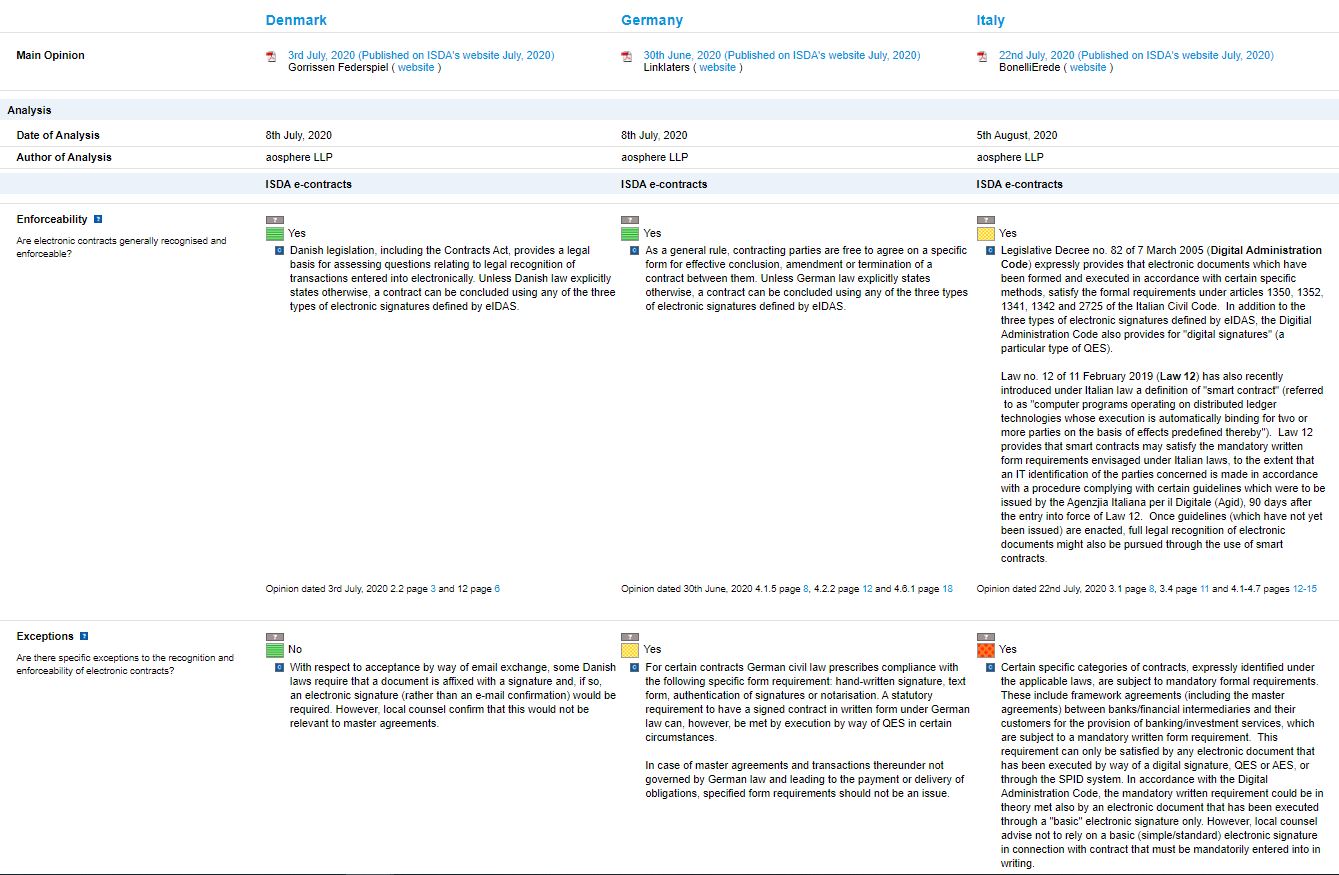In this Q&A, Rebecca Simpson from aosphere provides some useful insights on the complex analysis of the e-contract opinions published by ISDA and how diligence - ISDA e-contracts can help clients navigate these complexities.
How long have you been analysing these opinions, Rebecca?
I’ve been analysing ISDA opinions for many years both at aosphere and in my previous role at RBS/Natwest, but only in the last 18 months started to review the ISDA e-contract opinions. To be honest I initially assumed they would be quite simple to analyse and put into the aosphere traffic light format as they are not that lengthy (compared to say an average netting or diligence opinion) and cover a quite niche topic. I was definitely incorrect in that initial assumption! There are a large amount of complexities in some of these opinions and they take quite some time to fully read and review to ensure you have really extracted the key points and not missed any hidden issues. From my time spend as an in-house derivatives lawyer I can really see why having aosphere do the heavy lifting on the analysis is a real time saver.
So what do the opinions and the analysis cover?
They cover issues relating to the enforceability of electronically executed and confirmed derivatives contracts across the globe. They analyse factors relating to the use of electronic contracts, e-signatures and click-through agreements including enforceability and admissibility of electronic records in court proceedings. Interestingly, the product also includes some jurisdictions where there isn’t an ISDA netting opinion e.g. Ghana and Saudi Arabia, which may be of interest when looking to do business in more diverse markets.
Have you found a lot of variation between the laws in different jurisdictions? Which are the most complex?
Yes there is considerable variation in the laws across jurisdictions and the practical implementation or implications of those laws. Obviously, Covid-19 has increased the focus on electronic contracting as organisations try and deal with the inability to physically deliver or sign documentation and so some of these issues are really now becoming more obvious to market participants. Some examples of areas where the position isn’t straightforward include:
- Australia – there are a number of restrictions on the use of e-signatures which were ‘temporarily’ amended by the Australian government due to COVID-19. Uncertainty exists over when those ‘temporary’ measures may be removed.
- Italy – It is not be advisable to rely on a basic (simple/standard) electronic signature in connection with any contract that must be mandatorily entered into in writing (including Master Agreements).
- EU - the position is not fully harmonised and the law, and thus the opinions, for each EU jurisdiction will vary and have to be reviewed individually.
Are there any jurisdictions where the opinions have significantly changed since you have been reviewing them?
A good example of an update which saw a lot of changes, is Saudi Arabia, where we had to change our traffic light to Red as the legal position has significantly worsened. Our update noted that Master Agreements and transactions thereunder may require execution by way of wet ink signature and that a PDF copy may not be considered an original by a Saudi Arabian court.
So, how does diligence - ISDA e-contracts provide value?
diligence - ISDA e-contracts in simple terms does the heavy lifting of reviewing and analysing the opinions for you and presenting it in a simple to use colour coded format. Key features include:
- Tracking for new opinions and opinion updates so you won’t miss any changes when new opinions are published.
- Each e-contract report is colour-coded so that you can tell at a glance what the opinion says and compare answers across multiple jurisdictions in a single view.
- View and compare previous versions of the legal opinions for internal/regulatory audit purposes e.g. see the rules in Saudi before the rule changes as well as the current rules.
- Providing, in respect of each question, a cross-reference to the relevant part of the opinion for that jurisdiction, so that the detail may be easily checked. This can be a real time saver for some of the jurisdictions which have a more lengthy opinion (such as Austria and Malaysia).
The below screenshot shows the varying answers to the Exceptions question, at a glance.

Are there any plans to increase jurisdictional coverage?
Since the service launched in June 2020, the jurisdictional coverage has increased from 30+ to 60+ jurisdictions. ISDA have also commissioned opinions in the Czech Republic, Hungary, Lithuania, Malta, Peru, Poland, Scotland and Slovenia, and are planning to add more jurisdictions in the future. New coverage is all included in the single annual fee.
How aosphere can help
diligence ISDA e-contracts analyses ISDA's e-contract opinions on the enforceability of electronically executed and electronically confirmed contracts.
For more information on ISDA’s e-contract opinions, visit the ISDA website.




